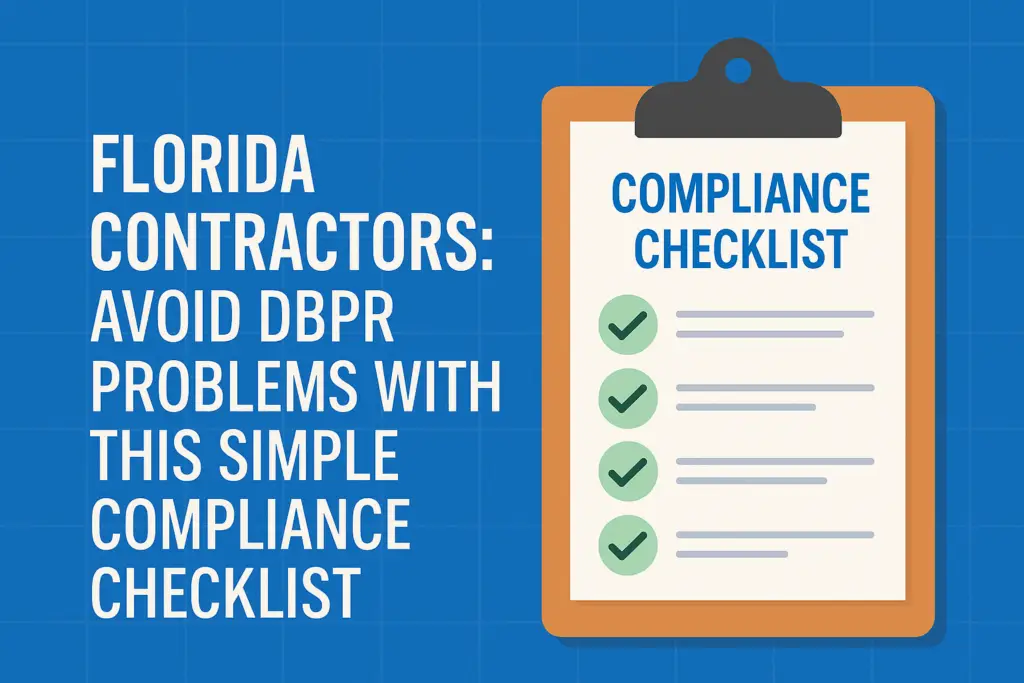In Florida, a contractor’s license isn’t just a piece of paper—it’s the foundation of your business. A single misstep can lead to complaints, investigations, and even license suspension or revocation by the Department of Business and Professional Regulation (DBPR). Fortunately, most common issues can be avoided with proactive compliance.
At Douglas Firm, we help Florida contractors stay ahead of DBPR problems. Here’s a simple checklist every contractor should follow to stay protected.
1. Maintain an Active and Proper License
Your contractor’s license must remain active and properly qualified at all times. If your business relies on a qualifier, ensure the qualifier is truly involved and compliant with Florida law.
Checklist:
- Renew your license on time.
- Ensure your business entity is properly registered with the state.
- If you’re a qualifier for another company, review your Qualifier Agreement to ensure compliance.
Related Resource: Construction and Electrical Qualifier Agreements
2. Pull the Required Permits
Starting construction work without the necessary permits is a fast track to a DBPR complaint and potential fines.
Checklist:
- Always check local building department requirements.
- Pull the correct permits before work begins.
- Confirm that subcontractors and supervisors understand permit requirements.
Related Resource: DBPR Complaints | Unlicensed Contracting Defense
3. Use Proper Written Contracts
Verbal agreements or vague written “estimates” expose you to disputes. Florida law requires specific contract terms for residential construction projects, including notices about lien rights.
Checklist:
- Have a detailed, signed written agreement for every project.
- Include payment schedules, scope of work, lien rights notices, and timelines.
- Customize agreements based on project type (residential vs. commercial).
Related Resource: Account Receivable Collections & Payment Disputes
4. Handle Deposits and Payments Correctly
Florida law limits how deposits and progress payments must be handled. Mishandling client funds can lead to complaints or even criminal charges.
Checklist:
- Never use client deposits for unrelated projects.
- Follow contractual payment terms exactly.
- Keep clear accounting records for every project.
Related Resource: DBPR Complaints | Unlicensed Contracting Defense
5. Manage Liens Carefully and Legally
Florida’s construction lien laws are complex and time-sensitive. Recording an improper lien can trigger civil suits, DBPR complaints, or even criminal charges.
Checklist:
- Serve a Notice to Owner (NTO) when required.
- Only lien for amounts truly due and unpaid.
- Record liens accurately and timely.
Related Resource: Florida Lien Machine
6. Verify Insurance and Workers’ Compensation
Proper insurance coverage protects your business and fulfills licensing obligations. Failure to maintain workers’ compensation insurance can result in severe penalties.
Checklist:
- Carry appropriate General Liability and Workers’ Comp insurance.
- Maintain certificates of insurance for all subcontractors.
- Update insurance documents with DBPR and clients as required.
7. Respond to Complaints Immediately
If you are notified of a DBPR complaint, take it seriously. Ignoring a complaint will not make it go away—it will make it worse.
Checklist:
- Respond promptly and professionally.
- Gather all relevant documents and communications.
- Consult legal counsel experienced in DBPR defense.
Related Resource: DBPR Complaints | Unlicensed Contracting Defense
Conclusion
Staying compliant isn’t just about avoiding problems—it’s about protecting your business and reputation. By following this simple compliance checklist, you can reduce your risk of DBPR complaints and focus on growing your business with confidence.
If you need assistance ensuring your licensing and business practices are in full compliance, or if you’ve already received a DBPR notice, contact Douglas Firm today for guidance.
Douglas Firm — Protecting Florida Contractors and Construction Businesses.
